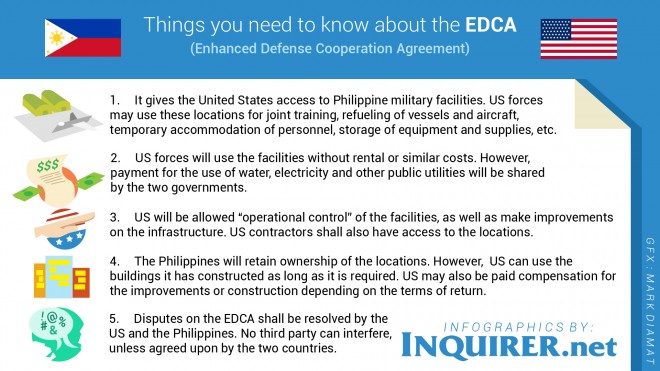MANILA, Philippines—The devil may be in the details.
While proponents of the Enhanced Defense Cooperation Agreement (EDCA) said that it would be mutually beneficial to the Philippines and the United States, its critics claim that it would give the US “rent-free basing and other perks.”
It took a while before the government released a copy of the controversial defense pact, and now that it has been made available, the public is able to get a glimpse of how US forces will operate in the country for the next few years.
US President Barack Obama, during his recent state visit, made it clear that they would have no permanent bases in the Philippines. But what does the agreement say? While permanent basing was explicity prohibited in the agreement, it pays to take a closer look at the provisions.
Below are some important points:
- It gives the United States access to “agreed locations,” mostly Philippine military facilities, for security cooperation exercises, joint training, etc. US forces may also use these locations for bunkering of vessels, refueling of aircraft, temporary accommodation of personnel, prepositioning of equipment and supplies, etc.
- The locations will be used by US forces without rental or similar costs. However, payment for the use of water, electricity and other public utilities will be shared “pro rata.”
- US will be allowed “operational control” of agreed locations. They may also make “alterations and improvements” to the facilities. US forces and US contractors “shall have unimpeded access to agreed locations” for the storage of defense equipment, supplies and prepositioned materiel.
- The Philippines will retain ownership of the locations. However, the US may use permanent buildings it has constructed until it is no longer required by its forces. The parties will agree on the terms of return of any of the agreed locations, including “possible compensation for improvements or construction.”
- Resolution of disputes on the EDCA shall be resolved between the two countries. It “shall not be referred to any national or international court, tribunal, or other similar body, or to any third party for settlement, unless otherwise agreed by the Parties.”
“The US government hit the jackpot thanks to the mendicant Aquino regime. US forces will have access to facilities, rent-free. They can store or preposition weapons in our country free of charge. They retain operational control of the facilities and shall only allow Philippine access based on operational and safety requirements. They can even use our country to deploy US forces overseas. They will operate those facilities like they do US bases,” Bagong Alyansang Makabayan secretary general Renato Reyes said in a statement.
But Presidential spokesperson Edwin Lacierda, in a press briefing on Wednesday, said “there is no such thing.”
“The principles in our Constitution regarding bases, regarding nuclear weapons—the prohibition of nuclear weapons—are evident in the provisions of the EDCA,” he said.
Lacierda reiterated that the purpose of the agreement was to promote the modernization of the Armed Forces of the Philippines (AFP).
Reyes, however, pointed out that “it is not clear how this can be accomplished.” He claimed that the country will become a “weapons depot” and Philippine soldiers “glorified security guards of US troops and their equipment.”
“We believe that this Enhanced Defense Cooperation Agreement will not only benefit them, but will also benefit us in terms of enhancing our military capabilities, improving our training, sharing of resources, for instance… How can we do mutual assistance when one side is not up to par with the other side? So we need to improve the level of capabilities insofar as where we are lacking,” Lacierda said.
RELATED STORIES
What does the new PH-US defense pact say?
What is the Enhanced Defense Cooperation Agreement and what does it mean for PH?
Philippines, US sign defense pact
